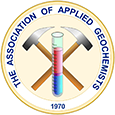HERBERT E. HAWKES (1913-1996)
Herbert E. Hawkes, one of the “founding fathers” of exploration geochemistry, passed away in Hanover, New Hampshire, on December 4, 1996 at the age of 83.
Educated at Dartmouth College, Columbia University, and the Massachusetts Institute of Technology, where he earned his PhD. in 1940, Herb was employed by the U. S. Geological Survey from 1940 through 1953. Near the end of World War II, the Chief Geologist of the Geological Survey requested proposals for postwar research projects. Herb, who had acquired an interest in trace elements as guides to ore from Hans Lundberg, a Swedish Canadian geophysicist, proposed a project to investigate the use of trace elements in soils as indicators of mineral deposits. This, along with projects involving water sampling and biogeochemical research by Lyman Huff and Helen Cannon, was approved and marked the birth of the Geochemical Prospecting Section of the USGS. Under Hawkes’ dynamic leadership, this small group began the development of a series of rapid, inexpensive methods of analysis, principally colourimetric, to supplant the emission spectrographic procedures then in common use. An early landmark was the field project performed by Hawkes and H. W. Lakin at the Friends Station zinc deposit in eastern Tennessee, where they demonstrated that the zinc content of residual soil over the deposit clearly indicated its location. This discovery, now so apparent, was an eye-opener to private industry. Company geologists soon followed with one of the first large-scale soil sampling programs in North America, which ultimately led to the discovery of commercial zinc deposits.
Frustrated with problems involved in measuring and interpreting the distribution of trace elements in water, Herb began to suspect that stream sediments might be a more effective sampling medium for reconnaissance surveys. Work performed by the Geochemical Exploration Section, in particular the development of the ammonium citrate soluble heavy metals test by Hal Bloom, convinced Herb that a new powerful reconnaissance tool was available. Believing that it was a once-in-a-lifetime opportunity to participate in commercial exploration work, Herb left the USGS for a privately sponsored stream sediment survey in New Brunswick and the Gaspe Peninsula of Canada. This survey was a milestone, being the first large-scale commercial stream sediment survey conducted in North America. Stream sediment sampling was shown to be a highly effective method of reconnaissance mineral exploration, and those areas of high geochemical relief are now known to contain most of the known base metal deposits of New Brunswick and the Gaspe.
While the New Brunswick work was under way, Herb accepted a teaching position at the Massachusetts Institute of Technology. Subsequently, he moved to the University of California at Berkeley, where he taught in one of the early multidisciplinary departments of mineral technology established in the United States. In addition to teaching, Herb's interest in the dissemination of knowledge in the field of exploration geochemistry manifested itself in his co-authoring with John Webb the first English language textbook in the field "Geochemistry in Mineral Exploration," published in 1962. This book, subsequently revised with A.W. Rose, has remained the standard text in the field for more than three decades. Following his teaching career, Herb served as a consultant for the United Nations and for a number of exploration companies. From the early days of the Geochemical Exploration Section, Herb Hawkes recognized that familiarity with the literature was a necessary adjunct to aggressive research work. Accordingly, he has been a leader in the compilation of bibliographies of geochemical exploration, first within the Geological Survey, and subsequently through the Association of Exploration Geochemists.
When the founding of this journal was mooted, Herb Hawkes was one of its most enthusiastic supporters. He was a member of the editorial board when the first issue was published and continued in this role for many years. His advice, support, and kindly nature are remembered by its “green” editor. Herb Hawkes was a strong, modest and gentle man. Although born in New York, he had the appearance of a rugged Western American, someone who, in an earlier time, might have led the wagon trains. Instead, in his time, he was a leader of the science of geochemistry.
--Eion M. Cameron, based on material by Frank Canney and Edward Post --
H. Hawkes's famous geochemistry textbook, PRINCIPLES OF GEOCHEMICAL PROSPECTING, is freely available from USGS at http://pubs.usgs.gov/bul/
